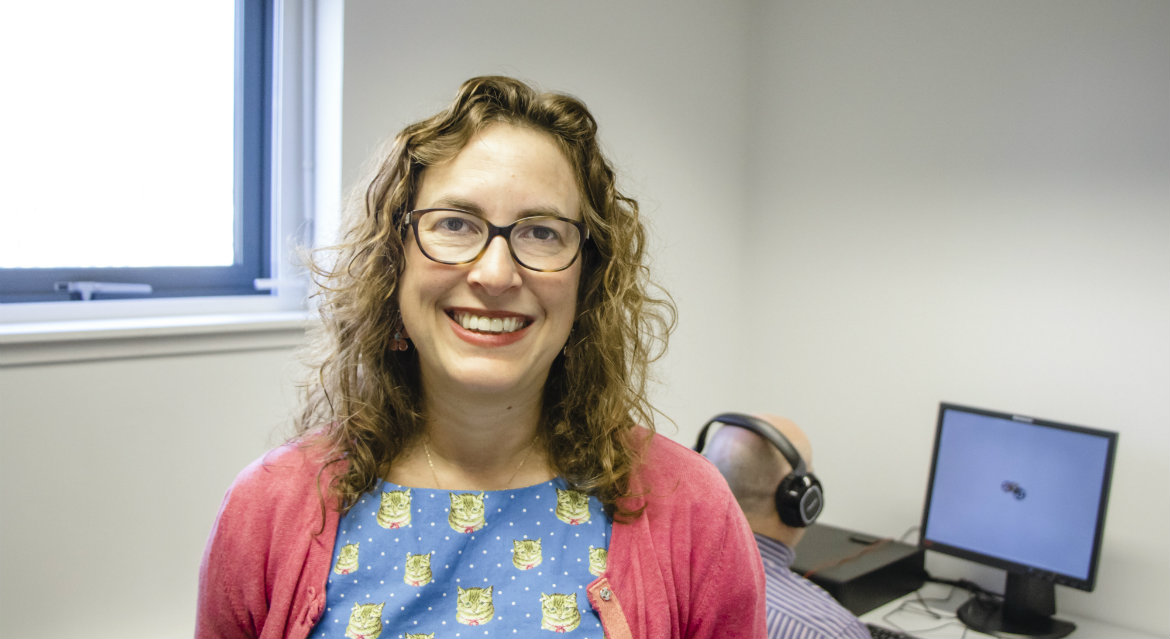New study finds dialects and languages are processed differently
Published On Fri 2 Feb 2018 by Grant Hill

Is saying ‘breeks’ instead of ‘trousers’ or ‘tatties’ instead of ‘potatoes’ like speaking a different language? New University of Dundee research suggests that dialects are processed differently to languages, an important finding as the distinction between the two is often controversial and politically charged.
Dr Alissa Melinger from the University’s Psychology department investigated word selection by speakers of two dialects by using an experimental paradigm developed to study bilingualism. She focussed on those who speak in Scottish dialect as well as Standard English in order to investigate whether Scots words form part of the English “dictionary”, or whether they constitute a separate lexicon.
In the study, which has been published in the psychology journal Cognition, participants were seated before a screen that displayed objects such as a potato, chimney or pair of trousers while distracting stimuli were played over headphones.
Previous research into bilingual word selection has shown that hearing a translation of a picture name speeds up word production. For example, if a Spanish-English bilingual hears the Spanish word manzana (apple), while trying to say apple in English, they will respond faster than if they heard some unrelated word, like coche (car).
Dr Melinger wanted to know if the same pattern would be observed for dialect translations, which would suggest that they were being processed like a separate language. When the distracting stimulus was the Scottish translation of the object (hearing breeks while trying to say trousers), participants were slower to name the picture than when they heard an unrelated Scottish word, the opposite to what has been found for bilinguals.
This suggests that the words used did not represent a distinct language to English and is consistent with the view that Scottish dialect words are processed in the same way as other English vocabulary items such as synonyms like sofa and couch.
“The reason I started this study was because, as an American living in Scotland, I hear a large difference in how my students speak to me compared with how they speak to one another outside of university,” explained Dr Melinger. “That means they are adjusting their speech to the social context, which is also something bilinguals do.
“I hear myself doing the same and speaking differently here than I do when I go back to the US and I wanted to understand how this linguistic adjustment is achieved for dialects. To use an analogy, if you are looking for an English word you find it by searching an English dictionary. If you want to find a French word you do the same with a French dictionary. What I wanted to find out was whether we organise Scottish words into their own dictionary or whether they are different words in an English dictionary.
“The findings from my study suggest there is a difference between selecting words from two dialects of English and selecting words from two languages. Depending on the social situation, we can choose Scottish vocabulary items, American vocabulary items, technical vocabulary items, or slang vocabulary items, but we select them from a single lexicon.
“This observation opens the door to subsequent investigations into other dialect pairs and can contribute to the longstanding debate about how to define a language and how to differentiate between a dialect and a language, potentially putting to bed political arguments about language status.”
The paper can be found at https://www.sciencedirect.com/science/article/pii/S0010027717303086.
For media enquiries contact:
Grant Hill
Press Officer
University of Dundee
Nethergate, Dundee, DD1 4HN
Tel: +44 (0)1382 384768
Mobile: 07854 953277
Email: g.hill@dundee.ac.uk